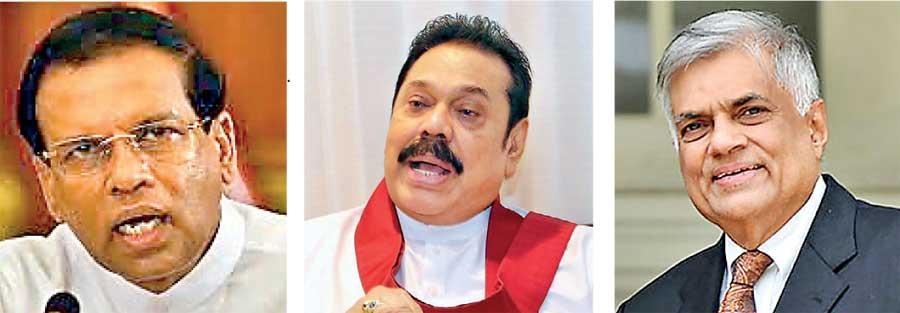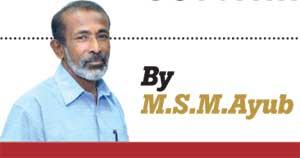Don’t throw the baby out with the water
Constitutional Council from inception lacked balance of views expected by the people

1 March 2019

 he 19th Amendment to the Constitution which was meant for the strengthening of democracy by reining in of the Executive Presidency has by now created several issues, challenging democracy.
he 19th Amendment to the Constitution which was meant for the strengthening of democracy by reining in of the Executive Presidency has by now created several issues, challenging democracy.It has somewhat bridled the Executive President, but at the same time unbridled the Prime Minister to the extent that under no circumstances he could be removed from the post.
The Constitutional Council which was meant to be a tool to democratize the key government institutions is under attack by some people who supported it earlier.
President Maithripala Sirisena who toiled to bring in again the Constitutional Council under the 19th Amendment is now criticizing the same openly.
Last week he went to Parliament and lashed out at the council in front of the Speaker who is the Chairman of the council. He said that his nominees for the Supreme Court and the Appeal Court have been rejected by the Constitutional Council.

He argued that his nominees had the right to know as to why they had been rejected, but the council had not communicated to him the reasons.
The situation has gone to the extent that not only the council but also some appointments to the higher courts made upon its approval are being insinuated to be politicized.
Opposition Leader Mahinda Rajapaksa, the one-time President who in 2010 abolished the Constitutional Council and the independent commissions appointed by it has joined the President in criticizing the Council on the same grounds.
Whether their allegations are sound or not, their argument that the composition of the council was not compatible with the political alignments caused by the recent political crisis has to be accepted.
Especially one cannot expect a relative balance of views in a Constitutional Council of which some of the members have been appointed on the recommendation of or approval of former Opposition Leader R. Sampanthan, as he no longer holds the post.
The mechanism to appoint the members of the Constitutional Council has never been challenged by any political party or civil society organization since the idea on the council was first mooted in 2001.
It is a commonly accepted view that the mechanism would give representation to all political affiliations in Parliament. Especially it is expected that the mechanism would strike a balance between the ruling party and the main Opposition in Parliament.
The council consists of ten members with the Speaker being the ex-officio Chairman and the Prime Minister and the Opposition Leader being ex-officio members."The only remedy for the incompatibility of the composition of the council to the new political alignments in Parliament is for the five members appointed on the agreement between the Prime Minister and the former Opposition Leader to resign so that the Prime Minister and the new Opposition Leader would be able to recommend five new members"
Other seven members are an MP appointed by the President, another two appointed with the agreement of the Prime Minister and the Opposition Leader but in consultation with political parties in Parliament, another one MP appointed with the agreement among the political parties apart from those of the Prime Minister and the Opposition Leader and three eminent persons appointed with the agreement between the Prime Minister and the Opposition Leader.
The current Constitutional Council was appointed before the political crisis that was triggered by the constitutional coup launched by President Maithriapala Sirisena on October 26, last year.
The crisis ended when Mahinda Rajapaksa resigned from the Prime Minister post on December 15 and was later recognized as the Opposition Leader by the Speaker.
Even during the time when Sampanthan held the post of Opposition Leader, he was closer to the government than Rajapaksa. Therefore the current Constitutional Council from its inception was seen lacking the balance of views expected by the people when the 17th and 19th Amendments to the Constitution were adopted.
The situation is now very clear as the new Opposition Leader Mahinda Rajapaksa had no say in appointing the members of the current Constitutional Council.
Out of the ten members of the council, Speaker Karu Jayasuriya and Prime Minister Ranil Wickremesinghe are leaders of the United National Party (UNP). Out of the two MPs appointed on the recommendation of the Prime Minister and the former Opposition Leader one is considered to be closer to the UNP than to the Mahinda faction or the Maithri faction of the United Peoples Freedom Alliance (UPFA). The other member is Chamal Rajapaksa, the brother of Mahinda Rajapaksa.
The representative of the parties other than those of the Prime Minister and the former Opposition Leader is Bimal Ratnayake of the Janatha Vimukthi Peramuna (JVP), a party opposed to both the UNP and the UPFA.
The three civil society members in the council may, in fact, be apolitical persons, but since they were appointed on the joint recommendation of leaders of the UNP and the TNA, UPFA might be treating them as their opponents or persons not preferable. Therefore, the UPFA seems to be assuming that seven out of ten members of the Constitutional Council are against them and they can rely only on President’s representative Mahinda Samarasinghe, Opposition Leader Mahinda Rajapaksa and Chamal Rajapaksa."The 19A bridled the President; unbridled the PM"
"CC which was meant to be a tool to democratize key government institutions is under attack by some people who supported it earlier"
In short, UPFA seems to believe that the council is anti-UPFA or at least pro-UNP. This situation is a direct outcome of the political crisis last October.
However, there is no provision in the 19th Amendment or in any other law to adjust the composition of the council according to the changes in the political alignments in Parliament. The 19th Amendment provides for the members of the council to hold office for a period of three years and the President as the appointing authority has no power to remove any of the members, whatever the good intentions he might have.
The only remedy for the incompatibility of the composition of the council to the new political alignments in Parliament is for the five members appointed on the agreement between the Prime Minister and the former Opposition Leader to resign so that the Prime Minister and the new Opposition Leader would be able to recommend five new members.
Yet, nobody can press them to do so as they were appointed legally and their continuation as members of the council is also still legally valid. Their continuation as members of the council is purely a matter of morality.
Here, the law has not been breached, but the purpose of the law has not been fulfilled, in the light of the law providing for the Opposition Leader to have a say in appointing the members of the council.
An interesting point is that the President who criticized the Constitutional Council for not giving reasons for its rejection of his nominations did not criticize the approvals given by the Council. Therefore, one can argue he had accepted the legitimacy of the council. On the other hand, he had not challenged the council as a mechanism that reins in the executive Presidency."Law has not been breached, but the purpose of the law has not been fulfilled"
The council indeed has proved to be a good bridle on the possible highhandedness of presidents, in spite of the current council having certain issues with the change of the Opposition Leader. The seeming attempts to rid the whole mechanism are like attempting to throw the baby with the water.
